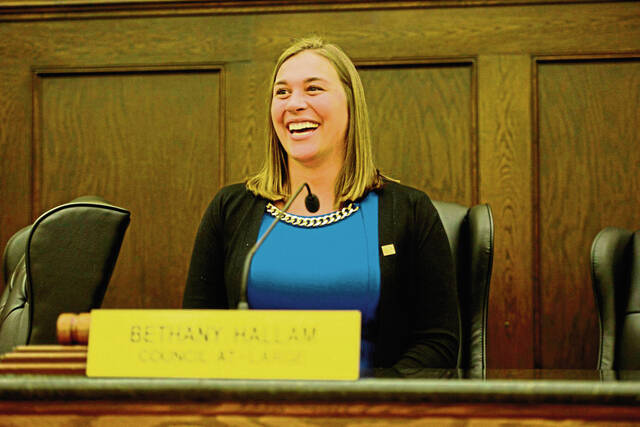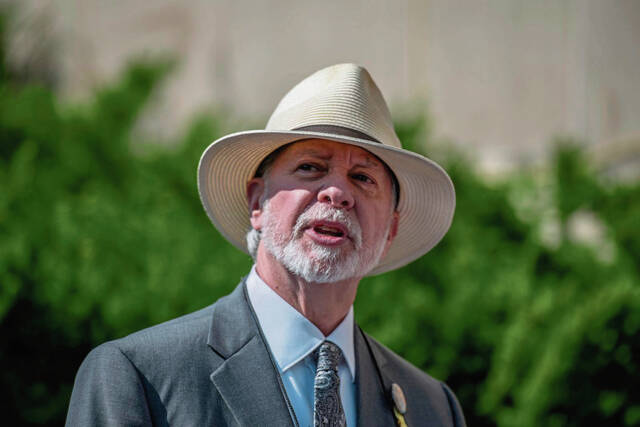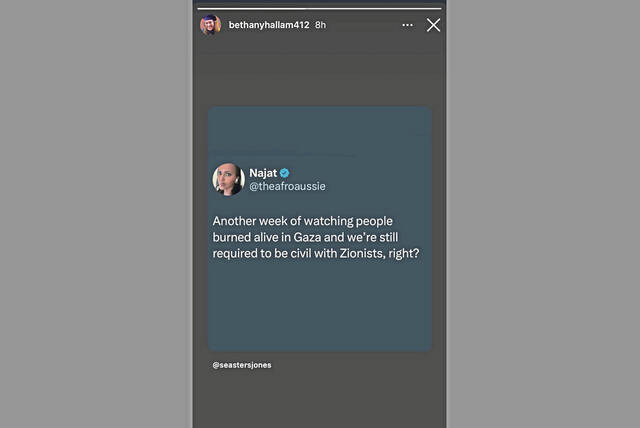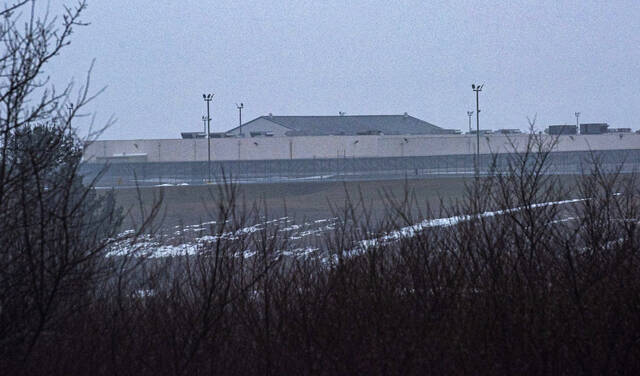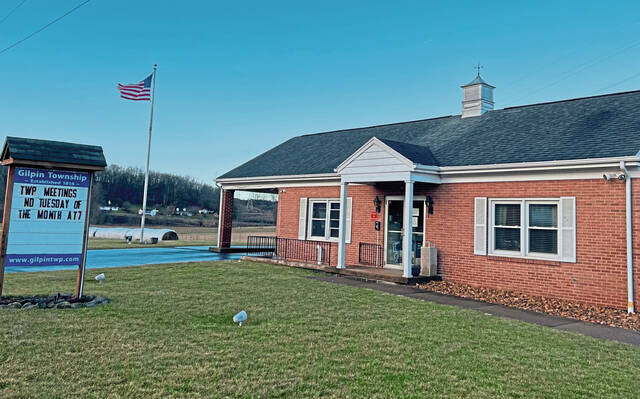The war in Gaza has triggered a war of words over antisemitism in Allegheny County.
Western Pennsylvania’s largest Jewish group recently rebuked a County Council member for endorsing a pro-Palestinian activist’s comments on social media.
“Another week of watching people burned alive in Gaza and we’re still required to be civil with Zionists, right?” the activist, who writes under the name Najat, posted on X to her nearly 25,000 followers. (Najat also has posted far more inflammatory comments, such as “ISRAEL HAS TO END” and “Please let 2025 be the year that Israel is finally dismantled.”)
Councilwoman Bethany Hallam shared the post on Instagram on Memorial Day, prompting a public reprimand by the Jewish Federation of Greater Pittsburgh.
The federation called Hallam’s post “dangerous” in light of the killing May 21 of two Israeli Embassy staffers in Washington, D.C. Police said the suspect told them, “I did it for Palestine. I did it for Gaza.”
“Coming on the heels of the murders in D.C. of two people attending an American Jewish Committee event, this communication calling for supporters of Israel to be subject to uncivil behavior is dangerous,” the federation said.
Hallam, a Democrat who represents 1.2 million county residents as an at-large councilwoman, is known for making the occasional impolitic or edgy statement.
The federation, however, viewed her endorsement of the activist’s post to be part of a larger, troubling pattern.
“Unfortunately, Councilmember Hallam has a history of justifying violence against Israelis,” according to a statement by the federation, which said she “reposted a celebratory video of Hamas terrorists breaking down the security gate” on Oct. 7, 2023, when terrorists launched a surprise attack on Israel, killing about 1,200 people and taking 251 hostages.
Israel struck back with a relentless and ongoing assault on Hamas and Gaza, killing and displacing tens of thousands of people, mostly civilians.
Hallam defended her position and said she is not antisemitic.
“I am very outspoken about the genocide of Palestinians, and it’s very upsetting that they’d try to interpret my heartbreak as anything but that,” Hallam, 35, of Pittsburgh’s North Side told TribLive.
Hallam’s action and the blowback it generated from the Pittsburgh area’s Jewish community underscore how events in Gaza continue to raise the political temperature in the U.S.
They also illustrate the power of words such as “Zionist” that are interpreted differently depending on who is using them, and they raise questions over whether being against Zionists is the same as being antisemitic.
“Zionism, the belief in the Jewish people’s right to self-determination in their ancestral homeland, is a core part of Jewish identity for most in our community,” the federation said. “To target ‘Zionists’ with threats of uncivil behavior and dehumanizing rhetoric is to endanger Jews everywhere, regardless of their views on Israeli policy or politics.”
Escalating antisemitism
The controversy involving Hallam comes as several high-profile attacks on Jews have dominated the news cycles.
On June 1, a man in Colorado armed with a makeshift flamethrower used Molotov cocktails to attack demonstrators who were calling for the release of Israeli hostages in Gaza. Twelve people were injured. The FBI has called the violence a “targeted terror attack.”
Similar incendiary devices were used April 13 when a pro-Palestinian activist firebombed the home of Gov. Josh Shapiro, who is Jewish, on the first night of Passover. The holiday celebrates Jews fleeing slavery in Egypt in biblical times.
In the meantime, the war in Gaza continued to claim lives as it marched past its 600-day mark. The death toll of Israel’s war against the terror group Hamas has surpassed 60,000, according to Gazan health officials. Hamas still holds dozens of hostages from when it stormed southern Israel on Oct. 7, 2023, in the deadliest attack on Jews since the Holocaust.
Antisemitic incidents have escalated locally and nationally.
As of last week, 156 antisemitic incidents have been reported to officials this year, up from 139 at the same point last year, said Shawn Brokos, director of community security for the Jewish Federation of Greater Pittsburgh.
“The fact that Jews in general are being demonized for the actions of a country — that’s total antisemitism,” Brian Eglash, the Jewish Federation’s chief development officer, told TribLive. “Nobody’s trying to torch Russians for the actions of Russia’s government.
“We saw this in D.C., and we saw this on Sunday,” Eglash added, referring to the attacks on the Israeli embassy staffers and in Colorado. “These actions are inspired by violent rhetoric. And it’s been unchecked since Oct. 7.”
A rabbi’s view
Hallam and her defenders say their concerns revolve around civilians suffering in Gaza, a stretch of land one-fifth the size of Allegheny County.
The councilwoman said she mourns the human toll of the war. Her decision to repost an activist’s remarks, she added, tried to express empathy with those troubled by Palestinian deaths and suffering who have difficulty seeing eye-to-eye with supporters of Israel.
Tree of Life Rabbi Jeffrey Myers doesn’t see it that way. In 2018, he escaped the Squirrel Hill synagogue where 11 worshipers were murdered in the deadliest antisemitic attack in U.S. history. The gunman was convicted in federal court nearly five years after the shooting. He remains on death row.
Myers read Hallam’s post online after vacationing in his native New Jersey on Memorial Day.
“I find any statement that creates an environment of fear — for any of your constituents — to be unproductive, unprofessional and in opposition to whatever oath you swore to uphold and represent the best interests of all of Pittsburgh,” Myers told TribLive.
“It saddens me,” Myers added. “The silence from others who should speak out also concerns me. … ‘Life, liberty and the pursuit of happiness’ does not come with a comma that adds ‘except for the Jews.’ ”
Dog whistle
An Anti-Defamation League official told TribLive the word “Zionist” can sometimes be used as a dog whistle for those targeting Jews — and as a slur.
“Since Oct. 7, we’ve seen and tracked a dramatic surge in antisemitic incidents — many of which are framed as ‘anti-Zionist’ but are unmistakably expressions of hate toward Jews,” Kelly Fishman, an Anti-Defamation League regional director, told TribLive.
She monitors incidents in Western Pennsylvania, Ohio, West Virginia and Kentucky.
“We need to insist on clarity,” Fishman added. “Criticism of Israeli policy is not antisemitic. But denying Israel’s right to exist, or attacking Jews under the banner of anti-Zionism, is.”
Antisemitism didn’t start — or end — in Pittsburgh with the synagogue shooting.
In 2024, nearly 300 antisemitic incidents were reported in Pittsburgh, the federation’s Brokos said. In 2018, the year of the synagogue shooting, it was less than one-tenth of that total.
Pennsylvania recorded the fourth-highest number of antisemitic incidents last year when ranked by state, an ADL audit showed.
Last year, for the first time in the ADL audit’s history, a majority of antisemitic incidents contained elements related to Israel or Zionism.
The ADL tracked more than 5,000 anti-Israel rallies last year. More than half involved antisemitic messaging in the form of signs, chants or speeches.
Some of those messages — such as chants of “From the river to the sea, Palestine will be free” — echo statements from “The Covenant of the Islamic Resistance Movement,” a 1988 treatise considered Hamas’ founding document.
Brokos has watched protests like those evolve since Oct. 7, 2023.
“What essentially started as pro-Palestinian humanitarian support and rallies morphed into events that promoted violence — not all of them, but some of them,” Brokos said. “That’s what serves as the threat to the Jewish community. And Pittsburgh’s not immune from that.”
Brokos said public comments like Hallam’s post can coincide with spikes in antisemitic acts locally. She could not cite specific data.
Pittsburgh impact
Jeremy Kazzaz fought in the Israeli military for more than a decade before taking on antisemitism in Pittsburgh.
A dual U.S. and Israeli citizen, Kazzaz leads Beacon Coalition, an antisemitism-battling nonprofit that backed Democratic mayoral candidate Corey O’Connor this spring. The group supported a referendum asking voters to endorse prohibiting discrimination by Pittsburgh against those conducting business with the city.
The ballot question referred to numerous types of discrimination, including on the basis of religion and “association or affiliation with any nation or foreign state.”
Pittsburgh City Council placed that question on the ballot after a pro-Palestinian group pushed to bar the city from doing business with any company that has ties to Israel. The effort was blocked in court.
The referendum passed May 20 by better than 2-1, and O’Connor knocked off incumbent Mayor Ed Gainey in the city’s Democratic mayoral primary.
Kazzaz, 39, of Squirrel Hill, said Jewish voters contributed to O’Connor’s victory.
A Brandeis University study published in 2017 pegged the number of Jews in an area encompassing five counties, including Allegheny and Westmoreland, at roughly 50,000 people, or 2% of the population. But they had an outsize impact in the Pittsburgh election, Kazzaz said.
Kazzaz pointed to Pittsburgh’s 14th Ward — which includes Squirrel Hill, the city’s center of Jewish life — where O’Connor captured nearly 72% of the primary vote.
O’Connor grew up in Squirrel Hill to a Christian father and Jewish mother. While a city councilman, his East End neighborhood was part of the district he represented.
Tension was common between Gainey and some Pittsburgh Jews, especially over the subject of Israel and its military efforts after Hamas’ 2023 raid.
While Kazzaz could not cite data about how the Jewish community voted, he felt the message sent by voters was clear.
“We saw in the most recent primary,” Kazzaz said, “that extremist views and policies and actions are not popular.”
‘Insane response’
Alison Dagnes, a professor who chairs the political science department at Shippensburg University in Cumberland County, said the notion of Jewish voters unilaterally backing Israeli policies or issues associated with Judaism doesn’t pass the sniff test.
“Being Jewish is very different than supporting (Israeli Prime Minister Benjamin) Netanyahu or the actions in Gaza,” said Dagnes, who is Jewish. “It’s tough to thread that needle. It’s very nuanced. And we’re not really big on nuance these days.”
Dagnes also pushed back on the suggestion that a single definition of “antisemitism” or one political stance on “Zionism” is more correct than another.
“This issue really becomes a Rorschach test for what you want to believe,” Dagnes said. “If you want to believe Jews are bad, you’ll find evidence for that. And if you want to believe Palestinians are bad, you’ll find evidence for that.”
Hallam, though, believes the issues in Gaza are clear-cut.
“Nonstop, since Oct. 7, every day, we’re watching babies burned alive,” Hallam said. “If your response to that is, ‘We’ve got to support Israel,’ that’s insane. That’s an insane response.”
A total of 45 people, most women and children, were killed in May 2024 when an Israeli airstrike ignited a blaze in the Palestinian city of Rafah, Gazan health officials told reporters.
Some elected leaders in Pennsylvania have pushed back on painting Israel as an aggressor.
U.S. Sen. John Fetterman, D-Braddock, remains one of Washington, D.C.’s most prominent defenders of the Jewish state since Oct. 7, 2023. He has drawn ire from the left for his vigorous — some say unwavering — support for Israel since the Hamas attack.
He also has vocally supported Jewish causes. Last month, Fetterman pushed legislation to help Holocaust survivors and their families reclaim thousands of pieces of artwork stolen by Nazis before and during World War II.
Hallam, whose Grant Street reputation is rooted in her brashness and willingness to tackle the status quo, said she will not apologize for amplifying the controversial post about Zionism.
“I always will speak out about things that are wrong,” she said.
Tanisha Long, a community organizer with the Abolitionist Law Center, is another Pittsburgher whose fiery social media posts about Palestinians have stirred the pot.
Long believes people need to embrace empathy. She feels Americans should not support one side in a conflict, regardless of that side’s actions, as if they’re rooting for their favorite sports team.
“I don’t think a person can look at what’s happening over there and have a political response. We need to respond as humanitarians,” said Long, 35, of Crafton Heights. “People can open their computers and see these images. Your first response should be, ‘How can I help?’ ”
Long and others also said some supporters of Israel accuse those who don’t agree with them of “antisemitism” to shut down dialogue about the myriad deaths in Gaza that pro-Palestinian supporters call a genocide.
Views from Israel
The United Nations says the Israeli government is committing genocide in Gaza.
In November, a UN special committee called Israel’s warfare in Gaza “consistent with the characteristics of genocide, with mass civilian casualties and life-threatening conditions intentionally imposed on Palestinians.”
Former Israeli prime minister Ehud Olmert wrote an op-ed article published last month in the Israeli newspaper Ha’aretz that said “the government of Israel is currently waging a war without purpose, without goals or clear planning and with no chances of success.”
“What we are doing in Gaza is a war of annihilation: indiscriminate, unrestrained, brutal and criminal killing of civilians,” he added.
Olmert served as Israel’s top elected leader from 2006 to 2009.
Some Israeli leaders have seized on that language, too — though sometimes with different goals in mind.
Just one month into the current fighting in Gaza, Israeli Agriculture Minister Avi Dichter told an Israeli TV reporter “We are now rolling out the Gaza Nakba,” a direct reference to the 1948 expulsion of more than 700,000 Palestinians from their land.
‘Silencing tactic’
Over the past year, perspectives on the conflict have shifted in the U.S.
In April, fewer Americans said the Israel-Hamas war was as important to U.S. national interests as it was in 2024, a Pew Research Center survey showed.
More than half of U.S. adults who Pew surveyed also expressed an unfavorable opinion of Israel, up from 42% in March 2022, polling data shows.
Long thinks the focus should be on those details when discussing Gaza.
“At no point should we stop talking about Palestinians in Gaza,” Long said. “And, when we take a post with Bethany Hallam and suggest she’s going to bring a wave of antisemitic posts … I think it’s a silencing tactic.”
Miracle Jones, a Pittsburgher and supporter of Palestine, said diverting a conversation about violence by parsing nuanced social terms misses the point.
“We are literally watching children burn to death, and we’re being told we can’t have this conversation because it will hurt people’s feelings,” said Jones, 38, of Allentown, who works as the director of legislative affairs for 1Hood Power.
Jones said she also was referring to Israeli airstrikes in Gaza in 2024. Palestinian families were praying and putting their children to bed in a Rafah camp for displaced people when fires triggered by airstrikes engulfed their homes.
Days later, at least 54 Palestinians were killed after an air strike on a Gaza City school, which also was housing displaced Gazans. Israel said it targeted a terrorist control center and accused Hamas of using “the Gazan population as human shields.”
“I am not espousing anti-Jewish ideologies,” Jones said. “Is it wrong to say, ‘We shouldn’t be burning babies?’ ”
Seeking common ground
Lita Brillman, a Greenfield Jew and former City Council candidate, said she feels part of the problem is splitting hairs about words’ meanings and intent.
“I would never suggest that because you’re not a Zionist, you’re antisemitic — that’s a tool Zionists use to make it more taboo to talk out against Zionism,” said Brillman, 30. “Antisemitism is real. It’s real right here in Pittsburgh. But children being starved or burned alive? Saying it’s antisemitic to call that out undermines the response to actual antisemitism.”
Pro-Palestinian activist Lauren Berry-Kagan, a Jew who moved from her native Seattle to Pittsburgh in 2023, said one thing to her is clear: “Criticizing the actions of the State of Israel is not inherently antisemitic.”
“These accusations of antisemitism distract us from the urgent reality that the Israeli government has blocked almost all aid into Gaza,” said Berry-Kagan, 30, a University of Pittsburgh alumna who lives in Point Breeze.
The Israeli government is “starving the over 2 million Palestinians trapped there, the Israeli military has killed tens of thousands of people and it’s doing this with the political and financial support of the United States.”
Myers, the Tree of Life rabbi, champions unity over divisiveness. He wants people of different faiths and different opinions to find common ground amid this period of tension and conflict.
He worries, however, that when an elected official co-opts a word that might harbor an implied meaning, it sets back the cause of fairness and equity for everybody.
“In a community that’s already faced the worst of humanity,” Myers said, “the continued expressions of these words — what does that support? How does that move us all forward?”


